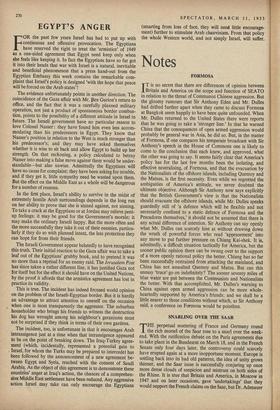EGYPT'S ANGER
FOR the past few years Israel has had to put up with continuous and offensive provocation. The Egyptians have reserved the right to treat the 'armistice' of 1949 as a one-sided agreement that Egypt need keep only when she feels like keeping it. In fact the Egyptians have so far got it into their heads that war with Israel is a natural, inevitable and beneficial phenomenon that a press hand-out from the Egyptian Embassy this week contains the remarkable com- plaint that Israel's policy is designed 'with the hope that peace will be forced on the Arab states'!
The evidence unfortunately points in another direction. The coincidence of the Gaza affair with Mr. Ben Gurion's return to office, and the fact that it was a carefully planned military operation, not just a product of spontaneous border combus- tion, points to the possibility of a different attitude in Israel in future. The Israeli government have no particular reason to love Colonel Nasser: they have found him even less accom- modating than his predecessors in Egypt. They know that Nasser's position in relation to the West is much stronger than his predecessor's; and they may have asked themselves whether it is wise to sit back and allow Egypt to build up her strength. On that reckoning, a policy calculated to betray Nasser into making a false move against them would be under- standable—but also unwise. Admittedly the Egyptians will have no cause for complaint; they have been asking for trouble, and if they get it, little sympathy need be wasted upon them. But the effect on the Middle East as a whole will be dangerous for a number of reasons.
In the first place, Israel's ability to survive in the midst of extremely hostile Arab surroundings depends in the long run on her ability to prove that she is sinned against, not sinning. To take a crack at the Egyptians or at Jordan may relieve pent- up feelings; it may be good for the Government's morale; it may make the ordinary Israeli happy. But the more often and the more successfully they take it out of their enemies, particu- larly if they do so with planned intent, the less protection they can hope for from their friends.
The Israeli Government appear belatedly to have recognised this truth. Their initial reaction to the Gaza affair was to take a leaf out of the Egyptians' grubby book, and to pretend it was no more than a reprisal for an enemy raid. The Jerusalem Post has since taken a rather different line; it has justified Gaza not for itself but for the effect it should have on the United Nations, by the proof it affords that the armistice agreement has lost in practice its validity.
This is true. The incident has indeed focused world opinion on the problem of the Israeli-Egyptian border. But it is hardly an advantage to attract attention to oneself on the occasion when one is most transparently the aggressor. The suburban householder who brings his friends to witness the destruction his dog has wrought among his neighbour's geraniums must not be surprised if they think in terms of their own gardens.
The incident, too, is unfortunate in that it encourages Arab intransigence just at a time when that intransigence appeared to be on the point of breaking down. The Iraq-Turkey agree- ment (which, incidentally, represented a potential gain to . Israel, for whom the Turks may be prepared to intercede) has been followed by the announcement of a new agreement be- tween Egypt and Syria, reached with the consent of Saudi Arabia. As the object of this agreement is to demonstrate these countries' anger at Iraq's action, the chances of a comprehen- sive Middle East settlement have been reduced. Any aggressive action Israel may take can only encourage the Egyptians (smarting from loss of face, they will need little encourage- ment) further to stimulate Arab chauvinism. From that policy the whole Western world, and not simply Israel, will suffer.










































 Previous page
Previous page